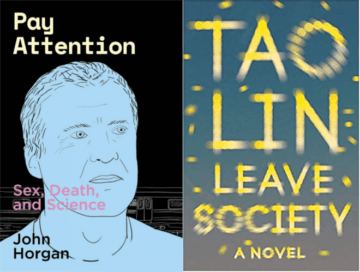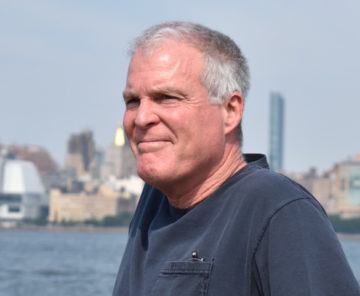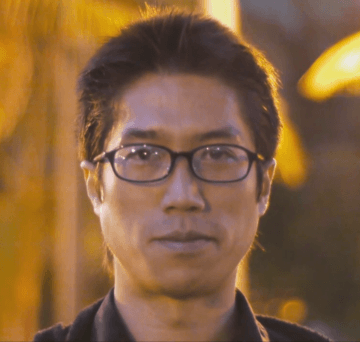by David Kordahl

From the moment we’re born into bright hospital lights until that last day when we’re topped off with embalming fluid, it’s hard to escape the human world. By the “human world,” here, I mean the world that we have built for ourselves, a world where, whether or not you know the specific secrets of bridge struts or brain imagers, you can be sure that someone out there knows. Most questions, here, have their straightforward answers. So many, in truth, that you can easily lose sight of the mystery, the “human” part of this world, hidden like a pilot light inside the machine.
John Horgan and Tao Lin are two writers who are each interested in both the “human” and the “world” parts of this, and each has recently written a new autofiction. Pay Attention: Sex, Death, and Science describes a day in the life of Eamon Toole, Horgan’s stand-in, an aging, recently-divorced professor who ruminates on free will as he looks forward to meeting his girlfriend. Leave Society, starring Li as a stand-in for Tao Lin, chronicles Li’s attempts to cure himself from society-induced sicknesses. By the end of the book, getting a girlfriend seems to do the trick.
It’s a little glib to compare these books just because they both involve sad guys who are grateful for their girlfriends. But Pay Attention and Leave Society also rhyme in more significant ways. Both are essentially about the shortcomings of traditional science in capturing the world. Horgan never pushes this idea very far, while Lin pushes it into the realm of pseudo-science. Yet it’s not obvious which book is ultimately more rational.

John Horgan is an important figure in science writing, whose first book, The End of Science, has turned out to be a significant one. That book argued that science had become a victim of its own success—i.e., that because so much had already been discovered, less was now left for future scientists. This thesis is often trotted out in the context of high-energy physics, where accelerators have failed to confirm the speculative schemes favored by many theorists, while old theories have continued to suffice.
I’ve never agreed with this thesis of The End of Science, but the book matters nonetheless. As I’ve argued elsewhere, Horgan is important less for his ideas than for his attitudes toward scientists. The End of Science treated prominent scientists as celebrities—as public figures whose claims were just as ripe for scorn as those of any other celebrities.
The fact that I’ve written about Horgan before, I should admit, is also the reason I’m reviewing Pay Attention. Horgan sent me a PDF of the book just before it was published, last December, looking for reviews. At that time, I opened it up and read the first chapter, and, realizing that I hated it, decided to stop. No need to make an enemy over nothing.
In the summer, however, I was on vacation and decided to give the book another shot, and read it in an afternoon. The book is a piffle, but if you can get past Horgan describing his wake-up farts and sleep boner in the first chapter, there’s fun to be had later on.
Pay Attention is narrated in a “stream-of-consciousness” style. I’ve included scare quotes here because Horgan seems less interested in literary experimentation than in delivering little abbreviated comedy bits, funny anecdotes that require some science literacy to unpack. When Eamon Toole—the character whose experiences exactly match those of Horgan—thinks about that time “Trivers” came to campus, readers are expected to figure out that he’s thinking about Bob Trivers, the evolutionary biologist, who John Horgan profiled in his last book, Mind-Body Problems.
Not much happens in Pay Attention. Eamon Toole wakes up, goes to work, teaches a class, has lunch with his colleagues, rides the ferry, goes to see his girlfriend. Mostly, we get a lot of science-flecked wallpaper.
Consider the section where Toole gets off the ferry at the end of the day. It’s a pretty fair representation of the observational comedy on display:
Cross parking lot to Hoboken Terminal. Terminal’s ancient copper façade covered with squirmy bas relief sculptures of…what are they? Leaves? Fish? Decorations serve no practical purpose except lining pockets of crooked Jersey contractors and politicians. No, too cynical. Civic decorations evidence of the same primordial urge that made our ancestors draw horses and bison on the walls of caves. Ladies rewarded talented stone-age artists in the usual Darwinian fashion, so we got the art instinct. Along with instincts for music, literature, religion, philosophy, science. It’s all male competition for females, that’s why females are less creative, they can always get laid, don’t have to compete for males. That’s what Miller says. Evo Psycho is fun, any asshole can do it.
This is sort of clever, but the lack of distance between the point of view of the character and the snark that Horgan regularly deploys makes passages like this one an interpretive dead end. Granted, evolutionary psychologists like Geoffrey Miller (I presume) make arguments like this all the time. Any asshole can. But so what? Why shouldn’t we take this seriously?
The problem with Pay Attention is that Horgan never quite allows himself to be a fictional character. The promise of autofiction is that it can be realer than just real—that it can allow authors to describe their lives with enough plausible deniability that the truth can be told. Horgan certainly has material for this sort of a book. The post-divorce experiences of a man reentering the dating scene after decades of marriage is fertile territory. But the voice here is always close enough to that of the essayist Horgan that Pay Attention never stands on its own. Even when Toole is admitting his faults, there always seems to be a certain argumentative insistence around the edges, a pushiness that fits better in essays than fiction.
 Tao Lin makes for a useful point of comparison. Lin has written, by now, several works of autofiction, and in books like Richard Yates and Taipei, Lin has depicted his own lightly-fictionalized experiences with such a precise deadpan that it was hard for readers to guess whether Lin understood just how unbearably annoying a character he had made himself out to be.
Tao Lin makes for a useful point of comparison. Lin has written, by now, several works of autofiction, and in books like Richard Yates and Taipei, Lin has depicted his own lightly-fictionalized experiences with such a precise deadpan that it was hard for readers to guess whether Lin understood just how unbearably annoying a character he had made himself out to be.
The formal distinction between Lin’s out-of-control persona and his ultra-controlled prose generated much of the interest in those early novels. I’ve argued in this column that Lin’s studious inscrutability reflected an early trend for artists of my generation. But the times have changed, and in Leave Society, Lin seems to have have changed, too, and to be better for it.
I realize, in writing this, that the question of whether Lin has improved or devolved has become the subject of some debate. Leave Society was published in August, and the reviews so far have been fairly brutal, despite the fact that the book is far cozier and more humane than anything Lin has previously attempted. In the novel, Lin’s proxy, Li, visits his parents in Tiawan and cares for their poodle, Dudu. He exchanges emails with his mom. He plays with his nephew. He reads books and thinks about them. He keeps detailed records, wondering how this will all fit into his book.
Which is all to the good, but only because I have left out the objectionable parts. The character Li—and, by extension, the writer Lin—has turned away from reckless drug use and toward reckless knowledge. (To be clear, Li has not turned away from drug use full stop—his continual use of LSD and cannabis, and his continual denial of this use, forms one of the book’s running gags.) Li is a serious reader, but not a critical one. When he finds a book like Nutrition and Physical Degeneration, he applies its lessons immediately, and is frustrated when his parents fail to follow suit.
Li’s credulousness has led some reviewers to question his underlying project. In Bookforum, Adam Wilson writes, “If Lin’s earlier books felt voiced by a human resigned to becoming an automaton, then this one speaks in a voice of resistance, albeit a deluded one.” In the New Yorker, Andrea Long Chu is even harsher. She sympathizes with Lin’s physical hypochondria (“Western medicine…has a poor track record with chronic pain”), but is much more dismissive of his other types of naïvete: “Li is also a hypochondriac of ideas—that is, he often thinks he has them.”
To be frank, I agree with these reviewers. But beyond the criticisms, it seems to me that Lin expresses something that’s way out past just positions and ideas.
Lin manages to dramatize the feeling that one has while encountering new possibilities. When he reads The Big Bang Never Happened (a book that I’ve also read), it seems clear that he does not push back nearly hard enough, and that he never asks what evidence makes its argument unconvincing to mainstream cosmologists. Ditto with many of his other obsessions. But this doesn’t stop me from sympathizing with his broader point, despite its coming at the end of a misinformed rant about “free energy”:
Li didn’t think anymore that he was going down “rabbit holes” when he researched nontrivial topics through individuals, papers, and books. He felt more like he was tunneling up out of the small, underground, man-made hole where he’d been born. Reading around 150 nonfiction books and 250 papers since 2013, he’d continually learned his worldview was too simple and/or vague. His skepticism had turned. He’d begun to distrust what he thought he knew, instead of everything else.
The success of Lin’s autofiction is in how well he is able to describe his thoughts without insisting that he is always right. Outside his fiction, Lin might advocate positions that put him beyond the pale (e.g., he’s a 9/11 Truther, and buys that vaccines cause autism). But within his fiction, he depicts himself without self-justification. When Li wakes up in the middle of the night and, concerned about the effects of electromagnetic radiation, carries his parents’ microwave out to the dumpster, Lin the writer is able to convey the absurdity of this scene, with a neutrality that never insists that readers take Li’s side.
I find myself at a strange impasse when I compare John Horgan and Tao Lin. On the one hand, if I were sitting next to either author on a plane, I suspect that I would agree with Horgan more often than I would agree with Lin. Horgan is a reasonable man, with reasonable things to say about many scientific issues. He is right about many little truths. But I can’t avoid feeling that Lin, even as he gets all sorts of little truths wrong, is on to some bigger truth, about the mysteriousness of our world, and about the disjunction between the way things are and the way they should be.
At the end of the day, Horgan is happy to have met a woman who will put up with his flaws. The real John Horgan continues to poke away at science, and is working on a book about quantum mechanics. The real Tao Lin, on the other hand, is detoxing in Hawaii, and has gotten some cats. He is trying to crack a book about UFOs, even as he works on summoning such entities via his intense concentration. I wish both of them well.
